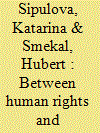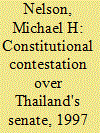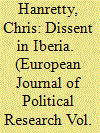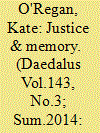|
|
|
Sort Order |
|
|
|
Items / Page
|
|
|
|
|
|
|
| Srl | Item |
| 1 |
ID:
177876


|
|
|
|
|
| Summary/Abstract |
The essay sheds light on the role of constitutional courts in transitional justice, focusing on their role in mitigating the conflicts between transitional justice and international human rights commitments. Through a study of the Czech Constitutional Court’s case law, we demonstrate that international human rights work both as a constraint and a tool. Constitutional courts use international human rights law selectively, when it suits their reasoning and views on transition. Nevertheless, the influence of international human rights law strengthens over time, especially when supported by the adverse rulings of international bodies, and gradually prevails over transitional justice justifications.
|
|
|
|
|
|
|
|
|
|
|
|
|
|
|
|
| 2 |
ID:
129641


|
|
|
|
|
| Publication |
2014.
|
| Summary/Abstract |
One key component of modern constitutions is the representative system. The often-contested codification of this system over time in democratizing political orders depends on a number of factors, such as the existing institutional setting, the power relations of important political actors, and the ideational resources, or political culture, available to the constitution drafters. This article examines the ideational resources drawn on by the members of Thailand's 2007 Constitution Drafting Committee (CDC) in debating and deciding the shape of the National Assembly's upper house, the Senate. This is mainly done by analysing the word-by-word minutes of the meetings. The respective processes of the 1997 CDC are described more briefly in order to provide background on an area of constitutional contestation that found its latest expression in November 2013, when the Constitutional Court invalidated the National Assembly's constitutional amendment, which would have reintroduced a fully elected Senate. The article contextualizes these developments by reference to mass protests against the "Thaksin regime" that had been organized since November 2013 by the so-called People's Democratic Reform Council (PDRC).
|
|
|
|
|
|
|
|
|
|
|
|
|
|
|
|
| 3 |
ID:
187731


|
|
|
|
|
| Summary/Abstract |
Third-wave democracies have massively adopted mechanisms of judicial review, notably constitutional courts, considered key institutions of successful democratic transitions. By preventing abuses of the constitution and safeguarding people’s rights, they act as a bulwark against the claims of potential autocrats. In Thailand, the 1997 democratic transition led to the adoption of a powerful constitutional court tasked with safeguarding democracy from the threats of populism, corruption, and authoritarianism. Yet since its inception, the court’s record has been puzzling. It has dissolved most, if not all, of the pro-democracy, anti-military political parties, dismissed all elected prime ministers, and paved the way for two military coups. In short, against established theories linking constitutional courts to democratization, the introduction of constitutional review in Thailand has led to democratic breakdown. To make sense of this puzzle, this article will investigate three variables of the court—strategic interests, ideologies, and institutional design—within the larger bureaucratic structure of the Thai state, to account for the anti-democratic behaviour of Thailand’s Constitutional Court. This piece considers materials in Thai and English.
|
|
|
|
|
|
|
|
|
|
|
|
|
|
|
|
| 4 |
ID:
113308


|
|
|
|
|
| Publication |
2012.
|
| Summary/Abstract |
In this article, the non-unanimous decisions of the Portuguese and Spanish Constitutional Tribunals for the periods 1989-2009 and 2000-2009 are analysed. It is shown that judicial dissent can be predicted moderately well on the basis of judicial ideal points along a single dimension. This dimension is equivalent to the left-right cleavage in both Portugal and Spain. The characteristics of the recovered dimension are demonstrated by analysing both the properties of the cases and the properties of the justices who decided them.
|
|
|
|
|
|
|
|
|
|
|
|
|
|
|
|
| 5 |
ID:
132775


|
|
|
|
|
| Publication |
2014.
|
| Summary/Abstract |
In a society such as South Africa in which the past has been deeply unjust, and in which the law and judges have been central to that injustice, establishing a shared conception of justice is particularly hard. There are four important strands of history and memory that affect the conception of justice in democratic, post-apartheid South Africa. Two of these, the role of law in the implementation of apartheid, and the grant of amnesty to perpetrators of gross human rights violations, are strands of memory that tend to undermine the establishment of a shared expectation of justice through law. Two others, the deeprooted cultural practice of justice in traditional southern African communities, and the use of law in the struggle against apartheid, support an expectation of justice in our new order. Lawyers and judges striving to establish a just new order must be mindful of these strands of memory that speak to the relationship between law and justice.
|
|
|
|
|
|
|
|
|
|
|
|
|
|
|
|
|
|
|
|
|